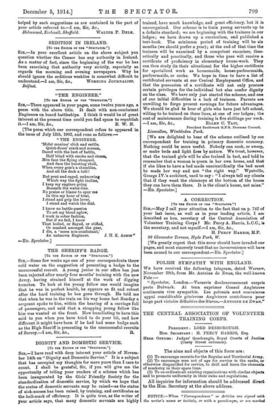DIGNITY AND DOMESTIC SERVICE.
[To THE EDITOR OF THE "SPECTATOR."]
Srs.,—I have read with deep interest your article of Novem- ber 14th on "Dignity and Domestic Service." It is a subject that has occupied my thoughts for more years than I care to count. I shall be grateful, Sir, if you will give me the opportunity of telling your readers of a scheme which has been inaugurated by the Girls' Friendly Society for the standardization of domestic service, by which we hope that the status of domestic servants may be raised—as the status of sick-nurses has been raised, by training, and certificates as the hall-mark of efficiency. It is quite true, as the writer of yoar article says, that many domestic servants are highly trained, have much knowledge, and great efficiency, but it is unrecognized. Our scheme is to train young servants up to a definite standard ; we are beginning with the trainees in our lodges ; we have drawn up a curriculum, and published a text-book. The minimum period of training will be six months (we should prefer a year); at the end of that time the trainees will be examined by a competent examiner, theo- retically and practically, and those who pass will receive a certificate of proficiency in elementary house-work. They can then study (in their situations) for the higher certificate for specialized work as housemaids, house-parlourmaids, parlourmaids, or cooks. We hope in time to have a list of certificated servants at our Central Employment Office, and that the possession of a certificate will not only procure certain privileges for the individual but also confer dignity on the class. We have only just started the scheme, and one of our initial difficulties is a lack of trainees. Parents are unwilling to forgo present earnings for future advantages. We should be glad to hear of girls who have just left school, willing to be trained on these lines, at one of our lodges ; the cost of maintenance during training is five shillings per week.
President Southwark G.P.S. Diocesan Council.
Lismullen, Wimbledon Park.
[We are delighted to hear of the scheme outlined by our correspondent for training in primary domestic economy. Nothing could be more usefuL Nobody can cook, or sweep, or make beds and light fires by nature. We trust, however, that the trained girls will be also trained in tact, and told to remember that a woman is queen in her own house, and that if she likes to have a bed made unscientifically the bed must be made her way and not "the right way." Wyatville, George 'V.'s architect, used to say : "I always tell my clients that if they want the chimneys at the bottom of the house they can have them there. It is the client's house, not mine." —ED. Spectator.]


























































 Previous page
Previous page